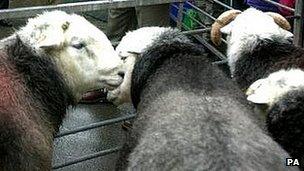Protected status for Lakeland Herdwick sheep
- Published

Herdwick sheep graze at heights of up to 3,000ft
A rare breed of Cumbrian sheep has been awarded protected status putting it in the same category as Champagne, Cornish pasties and Melton Mowbray pies.
Lakeland Herdwick sheep were first recognised as a breed in the 1790s and are now bred on 120 hill farms in the central and western Lake District.
A bid for Protected Designation of Origin status was made by the Herdwick Sheep Breeders' Association.
The European Commission has now approved the application.
Herdwicks, which often graze at heights of about 3,000ft (915 metres), are recognised as one of the hardiest British sheep breeds.
The distinctive tasting meat was sampled by the Queen at her 1953 Coronation banquet.
Meat from the estimated 50,000 animals can now only be classed as Lakeland Herdwick if they are born, reared and slaughtered at one of three registered abattoirs in Cumbria.
They were a favourite of Peter Rabbit creator Beatrix Potter, who kept her own herds.
'Tough life'
When she died she bequeathed 15 farms, covering almost 4,000 acres, to the National Trust on the understanding they were allowed to continue to breed Herdwicks.
It has taken 10 years for protected status to be granted, after the Herdwick Sheep Breeders' Association first made an application in 2003.
Pure bred Herdwick lambs are born largely black, often with tips of white on their ears.
As they age, the heads and legs become white and the fleece assumes a colour ranging from blue-grey to light grey.
Only pure bred Herdwick lambs display this dark colouration, making them easy to identify compared to other local hill breeds such as the Swaledale.
Amanda Carson, secretary of the Herdwick Sheep Breeders' Association, said: "We are absolutely delighted with this news.
"It means we can now assure the consumer of a quality product that is traceable and has a full audit trade.
"In light of recent food scares, this is really important.
"It is also vitally important to the hill farmers of Cumbria who have a very tough life indeed."
- Published8 May 2013
- Published21 June 2012
- Published7 July 2011